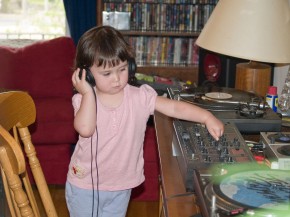During my teenage years, I had a good number of friends who were determined to be DJs. Personally, I was never very excited by DJ'ing, mostly because I found it rather difficult to a) find great music that other people would dance to; and b) work out when was the right moment to make the transition from one music track to another on a mixing deck. I was clearly never going to make it.
Last Wednesday, I found myself thinking about DJs. I was taking part in a live chat on the Guardian's Development Professionals Network focused on how to reduce poverty in Middle Income Countries (MICs). During the discussion, the chair asked me whether countries that provide aid – such as the UK – should work in MICs at all. This is an important question, because, for instance, as these excellent infographics by Development Initiatives show, aid is becoming a smaller and smaller component of overall financial flows in MICs. It has less relative ability to influence poverty reduction in such countries, and therefore could be less effective. At the same time, as Jonathan Glennie from ODI argues in this paper, the majority of poor people now live in MICs. Added to this, many MICs need help with tackling global public goods such as climate change and they also have major impacts on their (often low-income) neighbours. Should countries like the UK exit out of aid in such circumstances? And how will this affect achievement of a post-2015 set of development goals?
I thought back to DJ'ing.

In many ways, DFID needs to become a good DJ. It needs to make a seamless transition from one great bit of music to another. While the UK can't support every single country out there, the UK does need to transition away from traditional grant aid for MICs into other types of cooperation instruments that will support them to reduce poverty as they grow.
For example, in some MICs, it might be helpful to reduce poverty by growing businesses and jobs, which doesn't need traditional aid but actually needs loans or guarantees. Some MICs might be able to better reduce poverty in their own and neighbouring countries by investing in infrastructure or negotiating extra access to trade markets for key products. DFID is increasing our work in these areas, especially with fast-growing countries in Africa.
In other MICs, the majority of poverty might be concentrated in one particular state or region. For that region, traditional aid sent directly to the local government might be needed, but it won't be needed elsewhere. In other MICs, governments might not need any money at all, but instead need some help in designing the best new policies to reduce inequality, mitigate climate change or support the poorest people.
As my live chat continued, I realised that each MIC needs its own special balance of these instruments – its own special playlist.
In order to be effective, providers of development cooperation like DFID need to ensure that they, at the same time as reducing traditional aid in MICs, work together to ensure that other, non-traditional instruments are available – such as risk guarantees, loans, trade-opening instruments, aid to local governments, knowledge sharing. Internal processes such as the UK's Bilateral Aid Review and Multilateral Aid Review play an important part in helping make this smooth transition, while retaining focus. They help in bringing great new music seamlessly onto the turntable so that people keep dancing.
Today, Mexico and the UK are co-hosting an event in New York focused on how to reduce poverty effectively in Middle Income Countries, in preparation for the first ever meeting of the Global Partnership for Effective Development Cooperation in April 2014 (you can get more details about the event here).
My hope is that the discussants will – like me – identify that there needs to be a delicate mix of music or cooperation instruments for each country – tailored to their stage of development and their degree of inequality. Even better, they might begin to think of ways that the Global Partnership can actively scale-up and help to develop the new instruments to mix in, now and in a post-2015 world.
It's clear – we all need to become better DJs to do development.

2 comments
Comment by Leisa posted on
Nice Blog, Hannah. The analogy really works particularly because it reflects the dynamic interplay needed and smooth transitioning rather than the linear approach that tends to be taken to aid, cooperation and partnership. And like any DJ, its important to know when you have chosen the wrong music and be able to adapt and change quickly. Understanding your audience is key!
Best
Leisa
Comment by Fionnuala posted on
Interesting blog and important for DFID thinking going forward. One of the areas it overlooks though - and that is generally overlooked in these debates - is the important role of civil society organisations in middle income countries. These organisations not only provide essential services for poor and marginalised people (services which unfortunately are too often overlooked by governments) but also campaign for increased government spending on things like health and education, better taxation systems and greater accountability more generally. Part of the UK's transition strategy must be to sustain support for these organisations - both out of the DFID pot but also using FCO funding aimed at building democracy and promoting human rights.